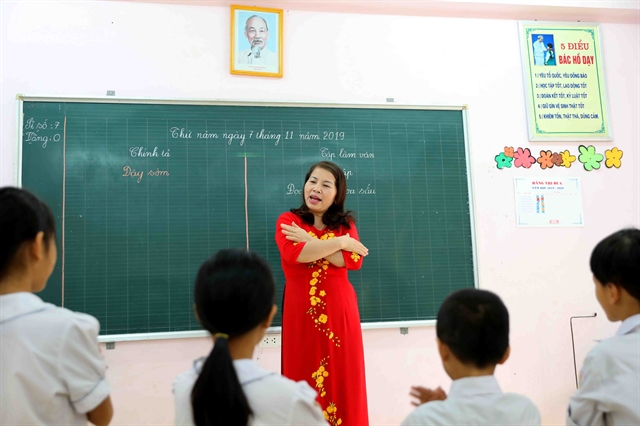 Society
Society

For 14 years, Thủy has taught children at the education, labour and social affairs centre No 2 in Yên Bài Commune, Hà Nội’s Ba Vì District. Many of the youngsters are HIV positive orphans, abandoned by their parents.

|
| Đinh Thị Thủy teaches children with HIV/AIDS to sing and dance. — VNA/VNS Photo Thanh Tùng |
HÀ NỘI — To the children she teaches, Đinh Thị Thủy is known as ‘mother’.
For 14 years, Thủy has taught children at the education, labour and social affairs centre No 2 in Yên Bài Commune, Hà Nội’s Ba Vì District.
Many of the youngsters are HIV positive orphans, abandoned by their parents.
Holding the hands of one such student, helping him learn how to write, Thủy said: “HIV/AIDS children have to take anti-retroviral (ARV) drugs on a regular basis so their cognition capacity is a bit affected.
“As the children are slower than normal ones, teaching them takes much more time than teaching normal children.”
Thủy has worked with infected children for so long, many ignorant people actually believe she too may have fallen victim to the disease.
At first, Thủy herself had doubts about taking on the challenge when she was offered the position in 2006 at fourth and fifth grade levels.
Due to a lack of understanding, her own family and friends also had voiced fierce objections to the position she was considering.
But any doubts she had faded the moment she met the children.
“I could not predict then how the road in front of me would be and what would be waiting for me ahead,” she said.
“A moment of change urged me to take the class.
“When tiny, shy children came to hug me and asked when they could go to school, I almost burst into tears,” she said.
Educating children with HIV/AIDS is not like any other teaching job.
Accidental nosebleeds are commonplace in classrooms, but at first as she helped to clean the children, she was concerned about getting blood on her hands.
But over time, and thanks to the advice from health professionals, she has learned how best to avoid infections and better care for the children.
“Children with HIV/AIDS lack affection so they express their love towards others in a special way,” she added.
After classes, children want to stay with her and hug her all the time. There is almost no distance between teacher and students.
Phùng Hải Nam, principal of Yên Bài B Primary School, which manages HIV/AIDS classes, told Vietnam News Agency that teachers are called ‘the soul healer’, helping to remove any discrimination.
Now outdoor activities are all welcomed by local people. The stigma attached is slowing fading away.
Teaching orphans and children abandoned by parents about family can also be a tough subject to face, as some have said to Thủy: “I don’t have a family. I am abandoned.”
But Thủy said that the youngsters they do have a family, the teachers are their mums and dads and their classmates are their brothers and sisters.
Aside from providing an education, Thủy does her best to help create a family environment. During Tết (Lunar New Year) festival, for example, she often brings the children to her home so they can experience a loving atmosphere at holiday time.
Her husband was also concerned when Thủy took the job, but those fears quickly eased when he saw the faces of the children she taught lighted up.
After 14 years, many of her early pupils have gone on to secure full-time employment and university education.
“The students’ maturity, understanding about themselves and their trust for me are the biggest present for a teacher in her 30-year career,” she said.
And no matter how old they are now, in times of need they will often pick up the phone and call Thủy for help and guidance.
After all, it is mother that always knows best. — VNS




